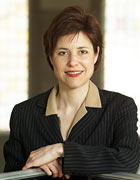
Melissa Rogers, visiting professor of religion and public policy.
Melissa Rogers, visiting professor of religion and public policy in the Wake Forest University Divinity School, says President Bush’s Supreme Court nominee, John G. Roberts, could play a pivotal role in cases related to government-sponsored religious displays and expression.
Rogers, an attorney who lives and works in Washington D.C., is an expert on the separation of church and state, religion and law and religion and politics. She says that Roberts’ record will be under close scrutiny when confirmation hearings begin.
“Part of Judge Roberts’ record is his service as deputy solicitor general during the George H. W. Bush administration,” said Rogers, who previously served as founding executive director of the Pew Forum on Religion and Public Life and as general counsel of the Baptist Joint Committee on Public Affairs. “In that capacity, he filed a number of briefs with the Supreme Court. One of those briefs was an amicus brief in the 1992 Lee v. Weisman case, a case considering school-sponsored prayer at a public middle school.”
Rogers said the brief submitted by Roberts and his colleagues argued that the court should uphold the school’s prayer policy. The brief also made a much broader argument, urging the court to abandon a traditional legal test used to judge a wide range of church-state issues. The court rejected these arguments, voting 5-4 against upholding the prayer and declining to make deep changes in church-state jurisprudence.
“A lawyer argues on behalf of his client, so it is not necessarily clear that (Roberts) embraces the positions advanced in that brief,” Rogers said. “But, one can expect Senators to use the brief as a springboard for questioning Judge Roberts about his views in this area, especially in light of the fact that this new nominee could significantly change the court balance on certain church-state issues.”
Rogers said that if the broad doctrinal changes advocated in the amicus brief authored by Roberts and his colleagues were to be embraced by a court majority, they would change the direction of church-state law in certain areas, such as governmental displays of the Ten Commandments and other acknowledgements of religion by the government.
“Justice (Anthony) Kennedy sided with Chief Justice (William) Rehnquist and Justices (Antonin) Scalia and (Clarence) Thomas in the recent Kentucky Ten Commandments case, and Kennedy has taken a similar view in an earlier case involving a government-endorsed religious display outside the public school context,” Rogers said. “In short, it appears that four sitting justices are now prepared to make some of the broad changes advocated in the brief written by Roberts and his colleagues in 1991. Thus, Judge Roberts’ future votes on these issues could be pivotal.”
Contact Rogers directly at rogersm@wfu.edu or 202-904-4936(M). She can also be contacted through Jacob McConnico at mcconnjn@wfu.edu or 336-758-5237 or 5238.
Categories: Media Advisory
Headlines
Wake Forest in the News
Wake Forest regularly appears in media outlets around the world.




